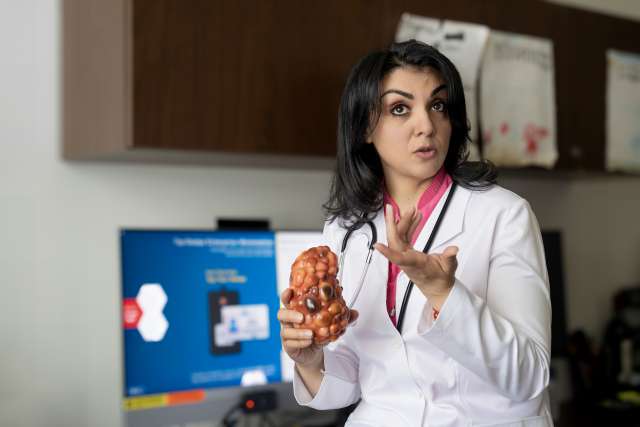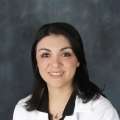For , a career as a doctor seemed almost preordained.
She grew up in Tehran in a family for whom medicine was the preferred path. Her late mother was a nurse and educator, and her father is a medical doctor. Dr. Nobakht’s brother became a nephrologist; her sister is a hospital physician.
“I had good family support, including a full-time working mom,” says Dr. Nobakht, an associate clinical professor of nephrology at the .
In 2023, after many years as a member of , Dr. Nobakht was elected as an executive councilor at large for the international organization.
WIN was established in 1983 to support the professional development of women in the field of kidney medicine. The organization facilitates mentorships for women in the field and advocates for education and research in women’s health.
In 2024, Dr. Nobakht also became the leader of the group’s women’s speakers bureau. In her roles at WIN, she said, she strives to improve the odds for women in the field of kidney disease, a specialty long dominated by men.
Taking on a leadership role
“She has risen to the challenge to be a highly motivated, enthusiastic and active member of the organization’s leadership,” says , a professor of medicine at the David Geffen School of Medicine and chair of the “Importantly, she has made contributions to the speakers bureau initiative.”
Dr. Nobakht and Dr. Nicholas, who is president of WIN, and two other executive team members at WIN co-authored a piece about the that was published in May by the American Society of Nephrology (ASN) Kidney News.
“Throughout history,” the article says, “women in medicine have been underrepresented in public and leadership roles, including as speakers and moderators at medical conferences and members of conference-planning committees.”
The article notes that barriers abound for women. At work, females may take on tasks for no or little pay, in part to overcome existing inequities in opportunities for career advancement. They also face challenges as they attempt to balance their work and family lives, and this extends to opportunities to attend meetings and conferences during evening and weekend hours.
To address such challenges, the article reiterates four strategies identified by previous researchers:
- Facilitating and prioritizing kidney-related research by women
- Instituting family-friendly policies at conferences and in the workplace
- Addressing discrimination against women at an institutional level
- Promoting women through mentorships and increasing opportunities for leadership roles
Some conferences, the article notes, have stepped up their game when it comes to supporting females. The ASN annual meeting, for example, increased its proportion of female speakers to 40% in 2019 from 20% in 2013. Female moderators also increased, to 47% in 2019 from about 25% in 2011.
“We do see improvement,” Dr. Nobakht says. “We’ve seen a lot of support and focus on improvement in the last few years.”

In a in Kidney International Reports, researchers noted that about 25% of nephrologists in the United States are women. But 36% of fellows are women, suggesting that the number of female nephrologists will continue to rise over time.
By comparison, 41% of all internal medicine residents and 44% of all residents and fellows were female. The data indicate that nephrology is not attracting a representative share. And equity remains elusive for those entering the specialty when it comes to achieving career goals.
“The glass ceiling is not breaking yet, and women remain underrepresented in leadership positions, academic medicine, and at medical meetings worldwide,” the article states. In the United States, just 6% of department chairs and 9% of division chiefs are women, the article says.
Dr. Nobakht — whose clinical research focuses on kidney disease, hypertension, women’s health and lifestyle-wellness — says she is grateful for the support she gets at work and at home from her husband, , an associate clinical professor of medicine and nephrology at the David Geffen School of Medicine.
Dr. Kamgar, who focuses on patient care and on the training of fellows, shares household duties and the care of their 11-year-old daughter, who was born at UCLA Health immediately after Dr. Nobakht completed her renal fellowship. The arrangement makes it possible for Dr. Nobakht to attend and speak at national and international conferences and meetings during evenings and weekends. Over time, Dr. Nobakht says, their daughter has grown more willing to share her mother with others.
After completing medical school in Tehran, Dr. Nobakht in 2003 joined the nephrology research fellowship program at the University of Colorado Denver. She spent three years there learning lab research and clinical work under the mentorship of the late Robert W. Schrier, MD, a towering figure in the field of nephrology.
She completed her internship and residency at the USC Keck School of Medicine and the clinical nephrology fellowship at the David Geffen School of Medicine. In 2013, she became a nephrology faculty member at UCLA.
Dr. Nobakht firmly believes in the connection between lifestyle and good health. She founded the Music & Kidney program at UCLA Health in 2017, with the aim of using music as a non-pharmacological intervention to treat depression, anxiety, pain and sleep problems in patients with chronic kidney disease who are on dialysis. She initiated a in collaboration with the neuroscience team at UCLA.
Most recently, Dr. Nobakht launched REPKID, a multidisciplinary project for female patients of reproductive age with kidney disease. It is a collaboration between UCLA Health’s divisions of obstetrics and maternal fetal medicine and nephrology. She plans to present the research at the 2024 ASN meeting.
Hints of progress
Dr. Nicholas, who completed her own clinical nephrology fellowship three decades ago, says she has witnessed the “slow but continuous rise in the number of women achieving distinguished positions within the field.”
There are signs of progress at the leadership level. ASN, the nation’s largest kidney organization, was established in 1967 and finally welcomed its first female president in 2009. The past three ASN presidents, including the current leader, have been women.
In addition, the National Kidney Foundation elected its first female president in 2010; since then, three women, including the current president, have led the organization. Notably, the European Renal Association, after 60 years in existence, elected its first female president in 2024.
The need is great. Kidney disease is the fastest-growing noncommunicable disease in the United States. About 35.5 million Americans have kidney disease, 808,000 Americans live with kidney failure and more than 557,000 Americans are on dialysis. According to the Centers for Disease Control and Prevention, nearly 11% of those age 40 to 59 have chronic kidney disease; for those 70 and older, the figure is 38.4%.
“Many positive acknowledgments of women’s prowess, expertise, skills and talent are occurring around us,” Dr. Nicholas says. “We hope that this trend will continue and that the WIN speakers bureau initiative will be recognized as an important resource for conference organizers to tap into.”






